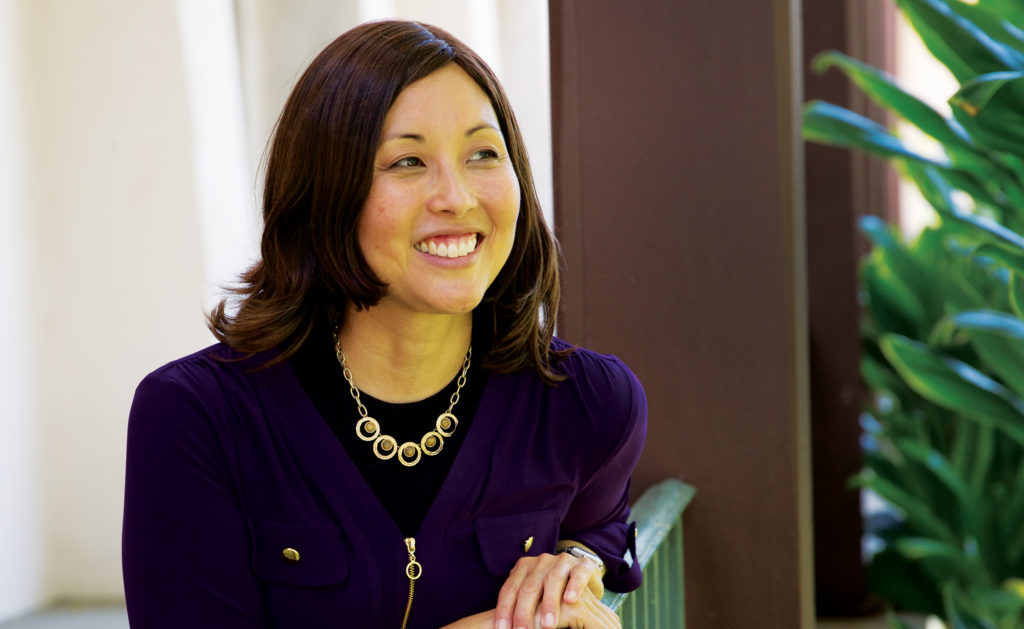Jerusalem, Tokyo and Budapest. These far-flung locations are home to alumni who have found their purpose thousands of miles from their Hawai‘i home. One a dancer, one an entertainer and the other a health services advocate, these three alumni have immersed themselves in new communities, and embraced new cultures and lifestyles, using their talents to make a difference on a global level. As cross-cultural understanding becomes vital to success, these global citizens model the skills necessary for students as they prepare to live and work in a global society.

The Dancer
By Erin Teruya ’93 Kinney
So much about Rachel Tina Horii ’87 Factor’s life has changed since she converted to Judaism, that it can almost be divided into a “before” and an “after.”
“Before” – when she was known as Tina Horii – Factor was a jazz dancer and Chorale singer, eager to break from Honolulu for a career in show business. She skipped college and toured the country with chart-topping singers, acted on Broadway, filmed TV commercials and danced as a Rockette in New York City.
“After” begins in 2000, when she met “a regular Jewish guy from Philadelphia” and made the surprising and very unorthodox decision to convert to secular, and then later, Orthodox Judaism.
Today, Factor is a married mother of five who lives as a devout Orthodox Jew in Jerusalem, Israel. Adherence to the religion and its rules requires the sacrifice of many secular comforts. Work, electricity and driving are not allowed during the Sabbath. Jewish law requires segregation between men and women, kosher diets, strict prayer schedules and limitations on media and technology. Factor wears a wig for modesty and clothing and stockings that cover everything but her face and hands. Each day is defined by religious routine.
“Morning prayer before a certain time, afternoon prayer before a certain time. Throughout your day, there are specific blessings you put on certain foods. Every time you put something in your mouth, you’re making a blessing. Every time you go to the bathroom, you’re making a blessing. There’s structure constantly throughout your day,” says Factor.
Perhaps because she experienced the transition in all its gradient steps, Factor shrugs off the suggestion that her two lives are so drastically different. “Coming from Hawai‘i, there is so much emphasis on family, food, community, love and education. When we moved to Queens (New York), we met Orthodox Jewish people, and I started to experience an Orthodox Jewish lifestyle. I had something so similar to it growing up, it wasn’t like they were new concepts. It was just speaking to me in a deeper way.”
If there was a moment that gave Factor pause as she considered conversion, it was the thought that she would need to give up dance, a lifelong passion. Throughout her youth, dance had been a way to express herself. Though her home life did not include organized religion, through dance Factor felt like she was connecting to a higher being.
“I thought, ‘I can’t do this.’ Dance was everything, it was my identity,” she says. “But then I came back to the idea that my connection to dance was for spirituality, and I felt converting was the way to get to a higher level of spirituality.”
With the same progressive spirit and entrepreneurial drive that had made Factor successful in New York and Hollywood, Factor found a way to keep performing. She wrote a one-person stage show about her religious conversion and changing identity. At first, she performed in little theater festivals around New York City. After moving to Israel, she performed the show for female audiences. “They thought it was so interesting, and it became quite big,” says Factor.
The show led Factor to open a dance school, where she trained a group of dancers to perform with her and to teach classes. “Girls didn’t have this form of self-expression or even fitness because our school system in Jerusalem is so limited,” says Factor. “Now they have something that is both spiritual and caters to the requirements of our society in terms of dress, movement and music. We’re using the arts to build self-esteem, self-confidence and pride in their Jewish heritage.”
Factor’s life before Judaism has served as a solid foundation for her life afterward.
“There are things that I carry with me from my Punahou education, especially because I didn’t go on to higher education, that instilled in me such a great sense of self-confidence to take any risk and pursue my dreams whatever they were,” reflects Factor. “Whether it was to become a dancer, or start a dance school, or to value my story enough to get up on a stage and tell my story of becoming me, it was all from my Punahou education.”
“So much of what I learned in that life, I brought with me. I’m so grateful to have both these parts of my life.”
See related profiles about Sumire Matsubara ’09 and Marcus Oda ’05.
